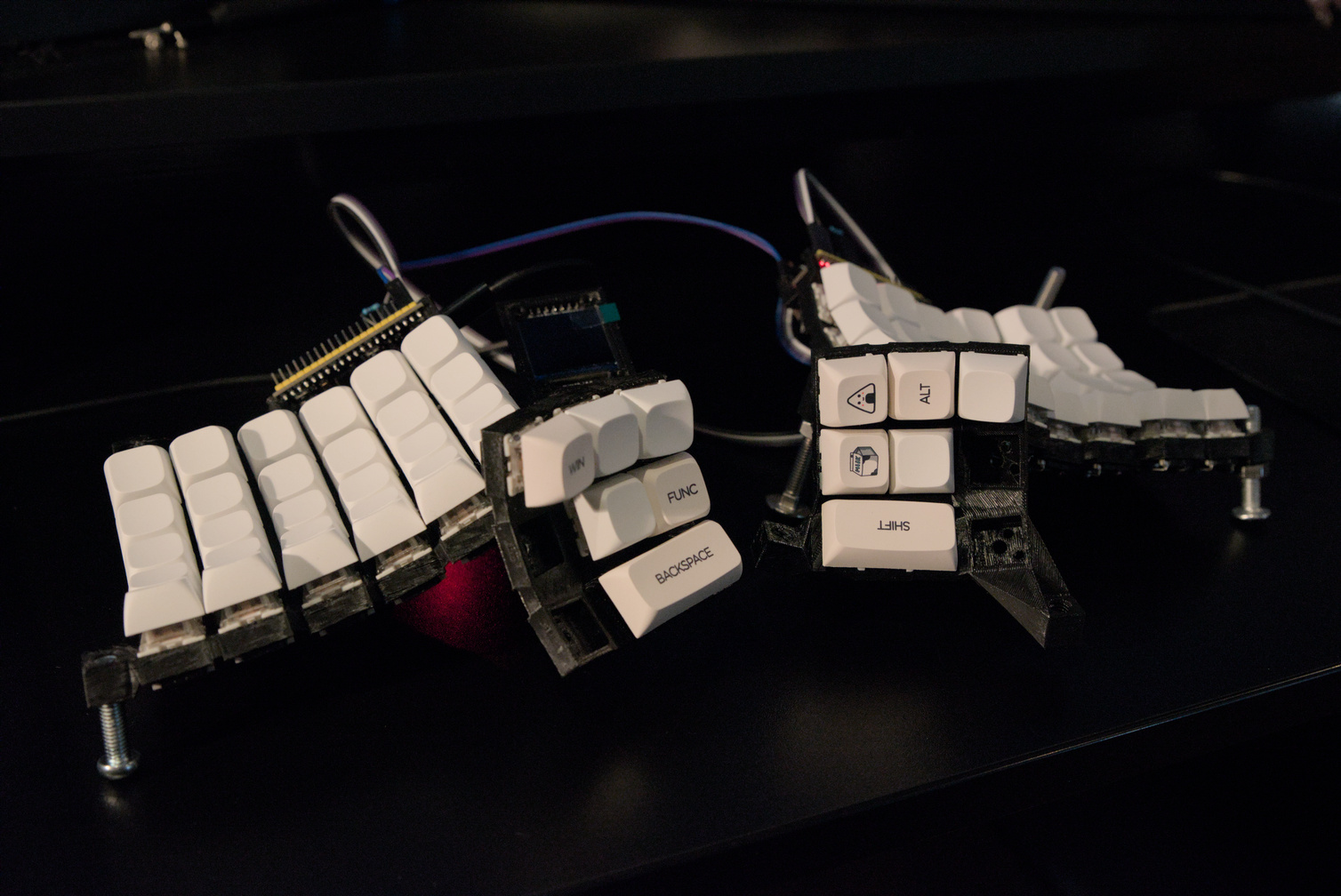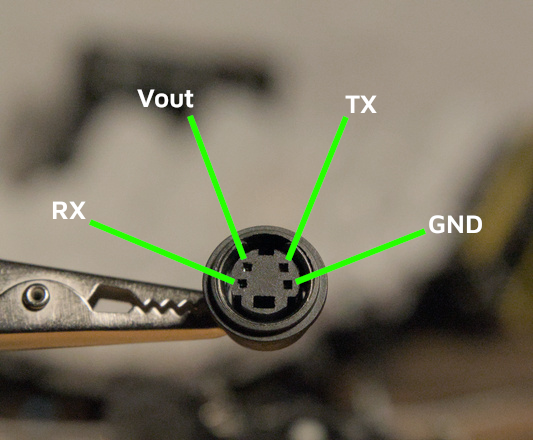https://github.com/whitelynx/dactyl-lynx-keyboard
Parameterized, split-hand, concave, columnar, ergonomic keyboard
https://github.com/whitelynx/dactyl-lynx-keyboard
dactyl keyboard
Last synced: 3 months ago
JSON representation
Parameterized, split-hand, concave, columnar, ergonomic keyboard
- Host: GitHub
- URL: https://github.com/whitelynx/dactyl-lynx-keyboard
- Owner: whitelynx
- License: agpl-3.0
- Created: 2020-11-19T22:51:02.000Z (over 4 years ago)
- Default Branch: main
- Last Pushed: 2024-12-21T15:10:51.000Z (6 months ago)
- Last Synced: 2025-01-28T01:36:46.664Z (5 months ago)
- Topics: dactyl, keyboard
- Language: POV-Ray SDL
- Homepage:
- Size: 131 MB
- Stars: 10
- Watchers: 3
- Forks: 1
- Open Issues: 0
-
Metadata Files:
- Readme: README.md
- License: LICENSE
Awesome Lists containing this project
- awesome-dactyl - dactyl-lynx-keyboard: A variant of the Dactyl ported to Python, with more aggressive tenting, almost-vertical thumb clusters, and adjustable feet.
README
# The Dactyl Lynx Keyboard
The Dactyl Lynx is a parameterized, split-hand, concave, columnar, ergonomic keyboard.
This is my fork/rewrite of [the original Dactyl][]. I've changed a few things:
* Rewrote the generating code in [Python][] instead of Clojure, using [SolidPython2][] and [spkb][].
* Rotated thumb clusters to be close to vertical (inspired by [the Dactyl-ManuForm][] and the way my thumbs move; see also Viktor Eikman's [DMOTE][] and [Concertina][] keyboards)
* Steeper tenting angle
* 1U or 2U keycaps - easy to source (look for ortholinear keycap sets, or possibly Ergodox sets with a few extra keycaps)
* Added a magnetically-attached back cover, with different variants (plain, or with feet)
* Modified keyswitch holes to support [Kailh hot-swap sockets][]
* Added a [TrackPoint module][] between the `D`, `H`, `B`, and `M` keys (`H`, `J`, `N`, and `M` on QWERTY)
* Added support for [my single-keyswitch hot-swap PCBs][]
* Created a new [RMK][]-based [firmware project][the dactyl-lynx-rmk repo] (RMK is a keyboard firmware system written in [Rust][], with [Vial][] support)
[the original Dactyl]: https://github.com/adereth/dactyl-keyboard
[Python]: https://www.python.org/
[SolidPython2]: https://github.com/jeff-dh/SolidPython/tree/master-2.0.0-beta-dev
[spkb]: https://github.com/whitelynx/spkb
[the Dactyl-ManuForm]: https://github.com/tshort/dactyl-keyboard
[DMOTE]: https://viktor.eikman.se/article/the-dmote/
[Concertina]: https://viktor.eikman.se/article/the-concertina/
[Kailh hot-swap sockets]: https://www.kailhswitch.com/mechanical-keyboard-switches/box-switches/hot-swapping-pcb-socket.html
[TrackPoint module]: https://github.com/alonswartz/trackpoint
[my single-keyswitch hot-swap PCBs]: https://hackaday.io/project/199185-lynxs-single-keyswitch-hotswap-boards
[RMK]: https://github.com/HaoboGu/rmk
[the dactyl-lynx-rmk repo]: https://github.com/whitelynx/dactyl-lynx-rmk
[Vial]: https://get.vial.today
[Rust]: https://www.rust-lang.org/

## Future plans
* Adding mouse buttons and a scroll ball from an [Apple Mighty Mouse][] next to the right-hand thumb cluster
* Adding a thumbstick to the left side
* Mounting the left thumb cluster on a hinge so it swings out of the way to access the thumbstick; when swung out of the way, it can trigger a microswitch to change to the gaming layout
* Multiple user-defined key maps that can be uploaded via USB and easily toggled between on the fly (I want this to replace my [Orbweaver][]) - Maybe use [Vial][]. (~~though Vial has a limitation of 4 layers~~ - it turns out you can force Vial to support more layers! It's still relatively limited, though)
* Adding support for ALPS or Choc switches instead of MX-style switches, along with appropriate hot-swap sockets (this will be mostly implemented in [spkb][] first)
[Apple Mighty Mouse]: https://en.wikipedia.org/wiki/Apple_Mighty_Mouse
[Orbweaver]: https://www2.razer.com/au-en/gaming-keyboards-keypads/razer-orbweaver-chroma

## Assembly
### Generating a design
#### Prerequisites
* [Python][] version 3.11 or newer
* [Poetry](https://python-poetry.org/)
* [OpenSCAD](https://openscad.org/downloads.html#snapshots) development snapshot 2024.12.06 or newer
* [POV-Ray][] *(optional, for rendering high-quality images)*
#### Installing dependencies
```bash
poetry install
```
#### Generating
```bash
poetry run python -m dactyl_lynx_keyboard.dactyl_lynx
```
To view the available options:
```bash
poetry run python -m dactyl_lynx_keyboard.dactyl_lynx --help
```
You can then generate STL files from the OpenSCAD files with:
```bash
scripts/render-stls.sh
```
You can also generate an image of the whole assembly:
```bash
openscad --camera=2,12,10,69.7,0,30,480 --autocenter --colorscheme BeforeDawn --imgsize 3840,1800 -o things/dactyl-lynx-6x5.png things/dactyl-lynx-6x5.scad
```
Or generate a much higher-quality image using [POV-Ray][] by running:
```bash
openscad --enable lazy-union --enable predictible-output --backend Manifold -o things/dactyl-lynx-6x5.pov things/dactyl-lynx-6x5.scad
povray +L/usr/share/povray-3.7/include dactyl-lynx-6x5-1920x950.ini
```
or using any of the other `.ini` files.
[an issue rendering some files this way]: https://github.com/openscad/openscad/issues/5447
[POV-Ray]: https://www.povray.org/
### Printing
Pregenerated STL files are available in the [things/](things/) directory.
### Bill of Materials
* 2x microcontrollers - one of the following ([see QMK docs][] for what combinations make sense)
* [RP2040 TYPE-C 16MB][] - *recommended*
* [Raspberry Pi Pico][]
* [STM32F4x1 Black Pill][]
* [STM32 Blue Pill][]
* [QMK Proton C][]
* 2x 4+-conductor jacks and matching cable to connect the two sides using full-duplex serial; one of:
* 4-pin mini-DIN (A.K.A. S-Video) - *recommended; if accidentally tugged on, it will cleanly disconnect without shorting anything and without pulling the other side of your keyboard off the desk*
* 4P4C, 6P4C, or similar modular connector (A.K.A. RJ11 or [telephone plug][])
* TRRS audio jacks - *not recommended; if you use this, be careful to not connect or disconnect the cable while the board is powered on!*
* any other 4-pin (or more) connector, though be wary of things like USB connectors that would be easy to mistake for other buses
* 74x [MX-style key switches][] *(or maybe Alps-style; I haven't actually checked if that will still work correctly)*
* 74x signal diodes *(1N4148 or similar works well)*
* 74x [Kailh hot-swap sockets][] *(optional - you can pass `socket_shape=mx_plate` to the `KeyboardAssembly` constructor in `dactyl_lynx_keyboard/dactyl_lynx.py` if you want to solder directly to the switches, or pass `socket_shape=mx_plate_with_board_mount` to use either my [MX single keyswitch hot swap board][] or my [Choc single keyswitch hot swap board][]; eventually these will be a command-line option)*
* A set of 74+ keycaps - symmetric unsculpted profiles work best with the sculpted form factor of Dactyl-style boards
* 72x 1u keycaps
* 2x 2u keycaps
* 24x [5mm x 3mm cylindrical magnets][], plus an additional 12 for each set of different bottom cases you want
* A USB-C *(or USB Micro-B, depending on your microcontroller)* cable to plug in your keyboard
* connection wires (and ideally some Dupont-style connectors for the microcontroller side of things, so you can swap the microcontroller if/when needed)
[see QMK docs]: https://docs.qmk.fm/#/feature_split_keyboard
[RP2040 TYPE-C 16MB]: https://www.aliexpress.com/item/1005003928558306.html?spm=a2g0o.order_list.order_list_main.23.42c018022ZKVRW
[Raspberry Pi Pico]: https://www.raspberrypi.com/products/raspberry-pi-pico/
[STM32F4x1 Black Pill]: https://github.com/WeActStudio/WeActStudio.MiniSTM32F4x1
[STM32 Blue Pill]: http://www.hiletgo.com/ProductDetail/2169541.html
[QMK Proton C]: https://qmk.fm/proton-c/
[telephone plug]: https://en.wikipedia.org/wiki/Telephone_jack_and_plug
[MX-style key switches]: https://mechanicalkeyboards.com/switches/index.php
[MX single keyswitch hot swap board]: https://www.flux.ai/whitelynx/mx-single-keyswitch-hot-swap-board?editor=pcb_3d
[Choc single keyswitch hot swap board]: https://www.flux.ai/whitelynx/choc-single-keyswitch-hot-swap-board?editor=pcb_3d
[5mm x 3mm cylindrical magnets]: https://www.aliexpress.com/item/1005005118080851.html
### Wiring
This is by no means a comprehensive guide to wiring a keyboard, but here's the approach I chose when building my first Dactyl Lynx:
* use COL2ROW diode orientation
* solder diode leads together for the rows
* use insulated hookup wire for the columns
* pick a pinout for wiring the 4-pin mini-DIN connectors:

* connect each column and row of a side to a different color of wire: (aside from some repetition because I ran out of colors)
| Position | Left Side | Right Side | Pin |
|--------------:|------------|------------|-----|
| Column 0 | brown | brown | 2 |
| Column 1 | red | black | 3 |
| Column 2 | orange | white | 4 |
| Column 3 | yellow | grey | 5 |
| Column 4 | green | purple | 6 |
| Column 5 | blue | blue | 7 |
| Row 0 | red | brown | 8 |
| Row 1 | orange | red | 9 |
| Row 2 | yellow | orange | 10 |
| Row 3 | green | yellow | 11 |
| Row 4 | blue | green | 12 |
| Row 5 (thumb) | purple | green | 13 |
| Row 6 (thumb) | grey | yellow | 14 |
*Note: the right side's color scheme should probably not be used; it's definitely more haphazard because it was done ad-hoc.*
*Note 2: the top columns cable on the left side finger well is wired in reverse; brown goes to column 5 instead of column 0, and so is on pin 7 instead of 2. The cable connecting to the thumb well is correctly wired, so the colors switch at the column connections.*
Wire according to [the key matrix in my `whitelynx/dactyl_lynx` QMK branch][QMK key matrix].
[QMK key matrix]: https://github.com/whitelynx/qmk_firmware/blob/whitelynx/dactyl_lynx/keyboards/handwired/dactyl_lynx/info.json
### Firmware
I've set up two separate firmwares that can be run on this board. The QMK-based variant is more featureful, but I'm devoting more time to the RMK-based one now.
#### RMK-based (new, more minimal)
See [the dactyl-lynx-rmk repo][] for this firmware. It's based on [RMK][]. (with [Vial][] support, written in [Rust][])
#### QMK-based (old, more featureful)
See [the corresponding firmware in my `whitelynx/dactyl_lynx` QMK branch][QMK firmware] for instructions on building and flashing the firmware.
[QMK firmware]: https://github.com/whitelynx/qmk_firmware/tree/whitelynx/dactyl_lynx/keyboards/handwired/dactyl_lynx
## Customizing
When customizing your keyboard, you might want to look at API docs for the classes in `dactyl_lynx_keyboard`. You can use `pdoc` for this:
```bash
pdoc -t templates dactyl_lynx_keyboard
```
If you have cloned the source for [spkb][] and/or [SolidPython2][], you can also include them:
```bash
pdoc -t templates dactyl_lynx_keyboard ../../spkb ../SolidPython/solid2
```
## License
Copyright © 2015-2024 Matthew Adereth and David H. Bronke
The source code for generating the models (everything excluding the [things/](things/) and [resources/](resources/) directories) is distributed under the [GNU AFFERO GENERAL PUBLIC LICENSE Version 3](LICENSE). The generated models and PCB designs are distributed under the [Creative Commons Attribution-ShareAlike License Version 4.0](LICENSE-models).